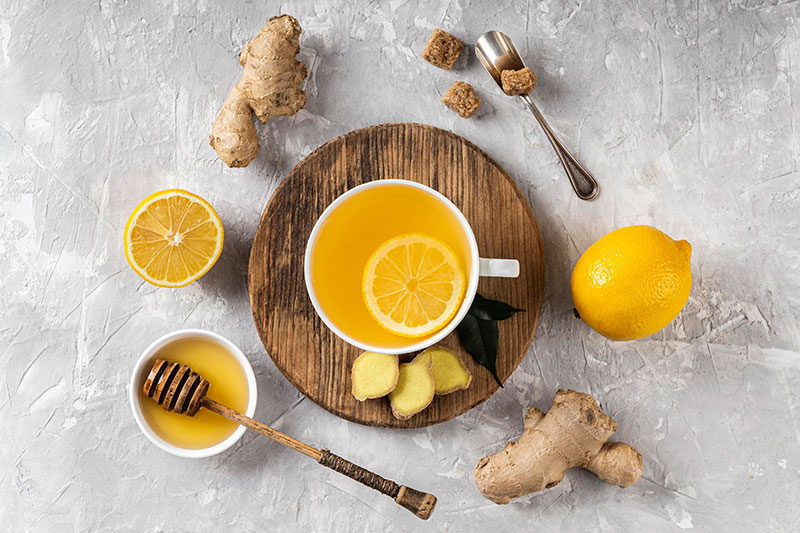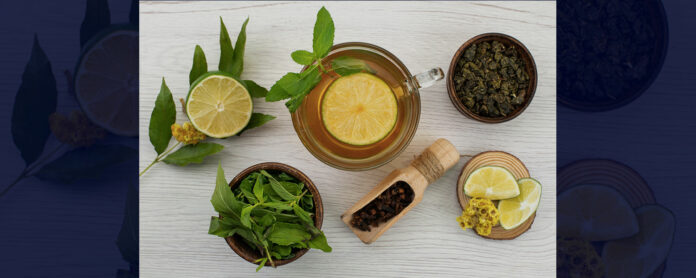As the winter chill sets in, the sniffles and coughs of the common cold become an unwelcome guest. But before reaching for over-the-counter medications, take a deep breath and explore the wisdom of Ayurveda, the ancient Indian science of healing. Ayurveda offers a treasure trove of natural remedies to gently nudge your body back to balance and conquer that pesky cold.
Understanding the Ayurvedic Perspective:
In Ayurveda, a cold is seen as an imbalance of the doshas, the three energies that govern our mind and body. When Kapha, the dosha associated with water and earth, accumulates in excess, it creates congestion and sluggishness, mirroring the symptoms of a cold. To combat this imbalance, Ayurvedic remedies focus on clearing Kapha and supporting the body’s natural healing mechanisms.
Ayurvedic Home Remedies for Common Cold are as follow:
- Ginger Turmeric Tea: Brew a warming cup of ginger and turmeric tea. Ginger’s Kapha-reducing properties and turmeric’s anti-inflammatory action work together to clear congestion and soothe a sore throat. Add a squeeze of honey for extra sweetness and boost.

Recipe:
Ginger Turmeric Tea – A Warming Elixir for the Soul
Ginger turmeric tea is a delightful and invigorating beverage that’s not only delicious but also packed with health benefits. Its warm, spicy aroma and taste are perfect for a chilly day or to soothe a sore throat. Here’s a simple recipe to whip up this healthy brew:
Ingredients:
- 2 cups water
- 1 inch fresh ginger, thinly sliced or grated
- 1/2 teaspoon turmeric powder
- 1/4 teaspoon ground black pepper (optional)
- Honey or maple syrup to taste (optional)
- Lemon wedge (optional)
Instructions:
- In a saucepan, combine the water, ginger, turmeric, and black pepper (if using).
- Bring to a boil, then reduce heat and simmer for 5-10 minutes, allowing the flavours to infuse.
- Strain the tea into mugs.
- Add honey or maple syrup to taste, if desired.
- Garnish with a lemon wedge, if using.
Tips:
- For a stronger flavour, you can use more ginger or turmeric.
- If you don’t have fresh ginger, you can use 1/2 teaspoon of ground ginger instead.
- You can also add other spices to your tea, such as cinnamon, cardamom, or cloves.
- This tea is best enjoyed fresh, but you can store it in the refrigerator for up to 2 days.
Benefits of Ginger Turmeric Tea:
- Ginger is known for its anti-inflammatory and immune-boosting properties. It can help to soothe a sore throat, ease nausea, and reduce congestion.
- Turmeric is a powerful antioxidant with anti-inflammatory properties. It may help to reduce pain and inflammation, improve cognitive function, and protect against chronic diseases.
- Black pepper helps to increase the absorption of curcumin, the active compound in turmeric.
Enjoy a cup of this warming and healthy tea and let its goodness work its magic!
Additional Safety Tips:
- While ginger and turmeric are generally safe for most people, it’s always best to talk to your doctor before consuming them in large quantities, especially if you are pregnant, breastfeeding, or taking any medications.
- If you experience any side effects from drinking ginger turmeric tea, such as stomach upset or diarrhoea, discontinue use and consult your doctor.
- Nasal Steam Inhalation (Nasya): This practice involves gently inhaling medicated steam to clear congestion and stimulate the sinuses. Add a few drops of eucalyptus or peppermint essential oil to a bowl of hot water, drape a towel over your head, and inhale deeply for a few minutes.
- Herbal Gargle: Gargle with a warm decoction of Neem leaves or Tulsi (Holy Basil) to reduce inflammation and fight bacteria. These herbs possess potent antibacterial and antiviral properties, aiding in speedy recovery.
Recipe:
Neem (Azadirachta indica) Gargle:
Neem, also known as Indian Lilac, is a powerful Ayurvedic herb with antibacterial, antifungal, and anti-inflammatory properties. It’s particularly effective in combating mouth ulcers and throat infections.
Ingredients:
- 1 teaspoon dried neem leaves
- 1 cup water
Instructions:
- Bring the water to a boil in a saucepan.
- Add the dried neem leaves and simmer for 5 minutes.
- Remove from heat and let the mixture cool slightly.
- Strain the liquid into a glass.
- Gargle with the warm neem water for 30 seconds, then spit.
- Repeat 2-3 times a day until your sore throat improves.
- Ayurvedic Soup: Nourish your body with a warm, Kapha-balancing soup made with vegetables like mung beans, spinach, and carrots. These vegetables are rich in vitamins and minerals that boost immunity and provide gentle detoxification.
Recipe: Spicy Sprouted Mung Bean & Carrot Soup: A Kapha-Balancing Delight
A steaming bowl of soup is the perfect comfort food when you’re feeling under the weather, and when it comes to Kapha imbalances like congestion and sluggishness, this Sprouted Mung Bean & Carrot Soup is a true champion.
Ingredients:
- 1 cup dried mung beans, sprouted (can substitute with 1 can diced kidney beans)
- 2 tablespoons olive oil
- 1 onion, chopped
- 2 cloves garlic, minced
- 1 inch fresh ginger, grated
- 1 teaspoon ground turmeric
- 1/2 teaspoon ground cumin
- 1/4 teaspoon cayenne pepper (optional)
- 4 cups vegetable broth
- 3 carrots, peeled and chopped
- 1 bay leaf
- Salt and pepper to taste
- Fresh cilantro, chopped (for garnish
Instructions:
- Sprout the mung beans: If using dried mung beans, rinse them thoroughly and soak them in water for at least 8 hours or overnight. Drain and sprout them in a jar with a damp paper towel for 2-3 days, rinsing and draining them twice a day. If using canned kidney beans, simply drain and rinse them.
- Heat the oil in a large pot or Dutch oven over medium heat. Add the onion and cook until softened, about 5 minutes.
- Add the garlic, ginger, turmeric, cumin, and cayenne pepper (if using) and cook for 1 minute, stirring constantly.
- Add the sprouted mung beans (or kidney beans), vegetable broth, carrots, and bay leaf. Bring to a boil, then reduce heat and simmer for 20-25 minutes, or until the mung beans are tender.
- Remove the bay leaf and discard. Purée the soup with an immersion blender or in batches in a blender until smooth. Season with salt and pepper to taste.
- Serve hot, garnished with fresh cilantro.
Tips:
- For a thicker soup, mash some of the cooked carrots before blending.
- You can add other vegetables to the soup, such as celery, zucchini, or spinach.
- If you don’t have sprouted mung beans, you can use regular mung beans, but they will take longer to cook.
- This soup is even better the next day, so feel free to make a big batch and enjoy it throughout the week.
- Rest and Abhyanga Self-Massage: Prioritize rest and allow your body to focus on healing. Treat yourself to a warm Abhyanga self-massage with sesame or coconut oil. This practice improves circulation, reduces Kapha accumulation, and promotes overall well-being.
Bonus Tip: Practice deep breathing and gentle yoga postures to further stimulate lymphatic drainage and clear congestion. Pranayama techniques like Kapalbhati and Anulom Vilom are particularly beneficial.
Remember:
While these remedies offer natural relief, consult a qualified Ayurvedic practitioner for personalized guidance and treatment plans, especially if symptoms persist or worsen.
By harnessing the wisdom of Ayurveda, you can unlock a treasure chest of natural remedies to combat the common cold and embrace a holistic approach to your health and well-being. Breathe easy, feel empowered, and let Ayurveda guide you towards a healthier, happier you!





